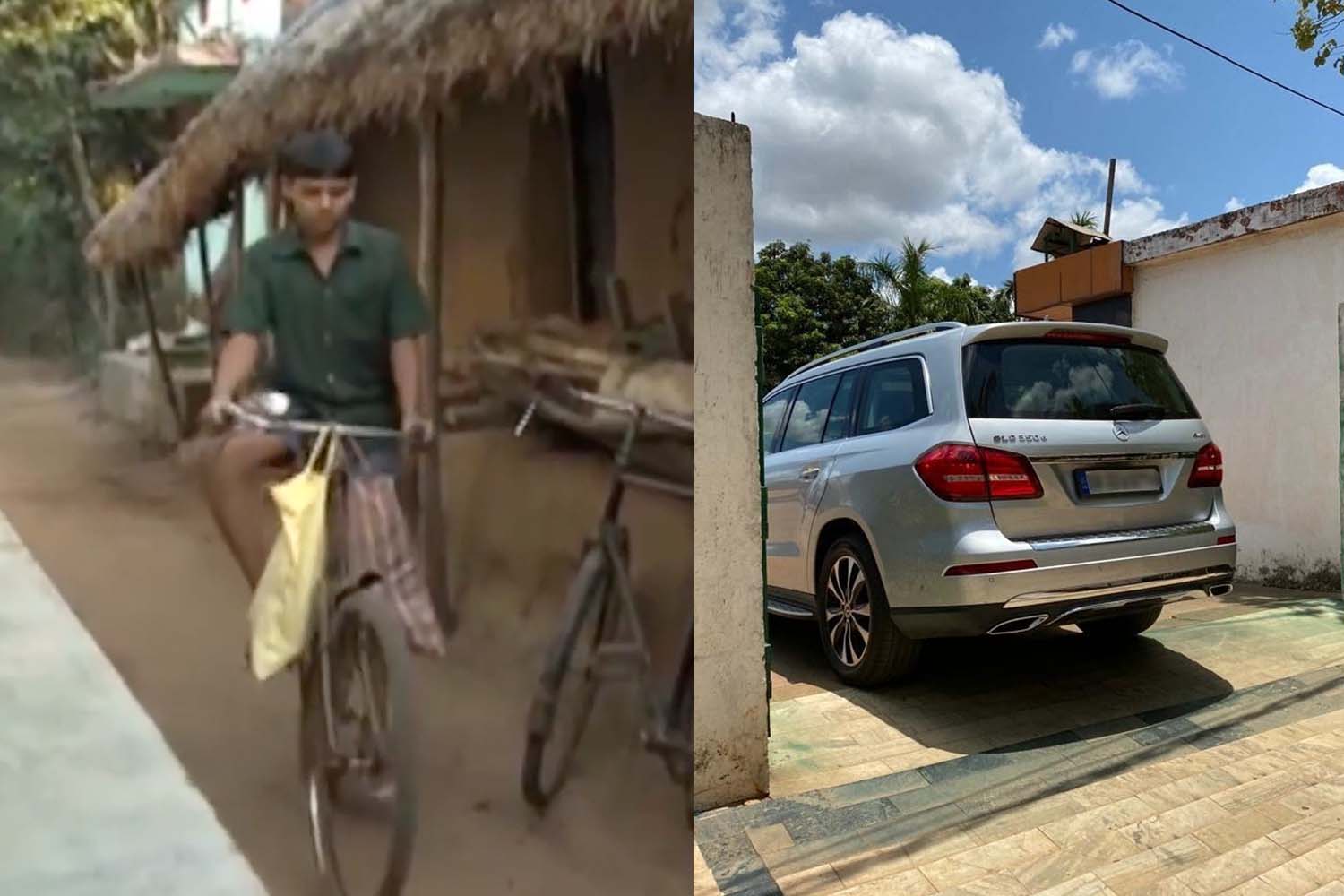The festive season starts with the fall of October. This is the season of unity, excitement and devotion. People from all socio-economic strata buy new clothes, celebrate, eat and travel. Even though the range of celebration differs according to their economic conditions, the intensity of the celebration is always high. It is an absolute matter of pride that, in this diverse country of ours, festivals keep us together, bringing a feeling of oneness.
Durga puja commences from the day after. With the arrival of the festivities, I am driven down memory lane by their nostalgic charm. Just a few decades ago seems like yesterday. I lived in a remote village called Kalarabanka. The time was when my family had no money or facilities to luxury. People from our village and the nearby villages used to shop, go out for dinners or vacations with their family, buy new clothes and renovate houses. The puja’s arrangement in the local arena was a thing that itself was good enough to cherish. All the exhibitions, lighting, food service, crowd control, security, idol arrangements — everything requires coordination and effort, which people love to do. The festival marked the beginning of something new and pure.
My eldest brother would send us new clothes, once a year, right before Durga Puja. This was the only time we had new clothes to put on. Iti, my younger sister, and I would wait eagerly for the rare delight to happen in our lives. Buying new clothes, once a year, was a luxury for us.
Being brought up in a village, I knew of no other vehicle except a bicycle. As a child, I attended a school that was 7 kilometres away. I would walk the distance every day. While coming back I had to purchase some groceries or essentials for home. I would carry it in my hands and walk the long distance. Occasionally, I would ride a friend’s bicycle, take him as pillion to school. We didn’t have money to buy a bicycle. My mother understood that I needed one without which I had to face a lot of pain of walking in the sun, carrying heavy bags of essentials and school bags after long tiring days at school. I still remember that my elder brother had sent a saree for my mother during Durga Puja. I had just graduated to Grade VII at that time. My mother, realising my pain, sold the saree at Rs 50 and bought me a second hand Norton cycle. That was a day of joy for me. I was so happy that Maa got me a cycle and understood how dear it will be as Maa sold her saree to a neighbour and bought it for me. Maa for once, didn’t show her sacrifice. My joy knew no bounds and I was glad that even I had a cycle like my friends. This was when I was in Grade VII. It made my life easy. Going to school and running errands became much easier for me. Sometimes I would take Maa or Iti as a pillion rider as well.
When I reached Grade X, Maa got me another cycle after saving each pie – Hercules Cycle. I remember it had a basket in front and I used to keep my books there while going to high school.
During, the formative years of KIIT & KISS, I bought a second-hand Hero Honda Sleek and today, I travel for work in a Mercedes. God has been very kind to me to have brought me from a level of a second-hand cycle to a luxury Mercedes standard. Even today, when travelling in this German-made car, I still cherish my days of the cycle. These memories of struggle keep me grounded and help me remain attached to my roots. My mantra is simple, a man who has achieved a lot in life should never forget who he was when he had nothing. Materialism should not change a man but rather develop his ability to empathise and be humble.
I remember what I was, I know what I am and I can foresee what I can become.



If you know where you are from, it is harder for people to stop you where you are going.
Matshona Dhliwayo
This thoughts is showing that a person how much simple and humble… in any one’s life no time will be permanent…it is dependent upon Us How we face and Use it…Sir You are Always Great…🙏🙏🙏😍😍😍🤩🤩🤩Happy Durga Puja…Maa Blessed All…💐🙏😍😍😍
Really Inspiration for all
🙏
Inspirational Story worth appreciating!
We learn lessons from Your life Sir.
We can protect our identity in the world and prepare ourselves for future challenges only if we remain connected and embedded to our roots.
Plain living, high thinking makes a man great!
Life is worth if we live for Others.
“There’s a famous Chinese proverb:
If You want happiness for an hour, take a nap.
If You want happiness for a day, go fishing.
If You want happiness for a month, get married.
If You want happiness for a year, inherit a fortune.
If You want happiness for a lifetime, help somebody else. ”
Life is worth if we live for Others.
Worth noting points from writeup:
“During, the formative years of KIIT & KISS, I bought a second-hand Hero Honda Sleek and today, I travel for work in a Mercedes. God has been very kind to me to have brought me from a level of a second-hand cycle to a luxury Mercedes standard.”
“Even today, when travelling in this German-made car, I still cherish my days of the cycle. These memories of struggle keep me grounded and help me remain attached to my roots.”
“My mantra is simple, a man who has achieved a lot in life should never forget who he was when he had nothing. ”
“Materialism should not change a man but rather develop his ability to empathise and be humble.”
“I remember what I was, I know what I am and I can foresee what I can become.”
Thanks
&
Regards,
Bijoy Kumar Mishra.
ସାର୍ ପ୍ରଣାମ 🙏🙏 ଆପଣ ମୋ ପାଇଁ ଈଶ୍ବର ସମାନ,କେବଳ ଆପଣଙ୍କ ପାଇଁ ମୋ ପୁଅ କୁ ମୁଁ କିଟ୍ ରେ ପଢାଉଛି। ଜୀବନରେ ଥରେ ଆପଣଙ୍କ ପାଦ ଛୁଇଁ ପ୍ରଣାମ କରିବାକୁ ମୋର ଇଚ୍ଛା 🙏🙏
Very true story,it will inspire others 🙏🎉💐
The journey which made you human is a learning experience ……….o .o👍
I get tears in my eyes when I read about your journey of life. These are tears of sublime joy. How can a man, whom I am proud to have known for a long time, be so humble and grounded, retain all the virtues, even after achieving so much in life? It’s all because of the sanskaar and the sublime blessings of your parents and elders. Long live sir!
If we are connected to earth inspite of having feathers to touch the sky then no one can stop us.That’s the reason everybody admirers you.🙏
Hon’ble Sir, along side time & fate, I always think upon your selfless, sincere and sacrificed efforts to uplift others. Sir, still a number of achievements are there in front of you and, it’s sure, no evil power can restrict you to touch the high altitude.
O/o DyCoE & O/o Dean
School of Civil Engineering
KIIT University, Bhubaneswar
An inspiration for all of us 🙏
Excellent read
No one can take the place of Maa. Her every sacrifice for her children may not mean anything to her but bring smiles on the face of children. Smile or joy of children relieves all pain of a mother. Salute to your Maa, sir🙏🙏
Sir your humility is exemplary for all. Reading your memories of Durga Puja surely made all of us go down the memory lane. May you continue to make many such memories in the coming years.
Pranam Sir
Very inspiring story of your life
Inspiration to millions
Always inspired by you
You are truly inspiration for us.
We are proud of you Sir🙏🙏
Inspiring truly.
We are proud of you Sir🙏🙏
Good inspiration for me.
Very Inspiring 🙏🙏
Choosing to be positive and having greatful is always determine one’s life. It signifies that what have strived never stop believing in yourself of your capabilities.
Your humility and simplicity made you so great sir.
Very very inspiring autobiography sir. It will put a lasting impact on many. It’s made my day sir.
Pranam
We should always remember our basics, roots from where we have grown and we must contribute to our society. You are truly one such inspirational, beautiful soul created by God
An inspiration for all of us 🙏
Inspiring
Extremely inspiring article. Loved reading it.
Hon’ble founder’s journey in life through trials & tribulations is very fascinating & educative. Though he has achieved a lot, he has not forgotten the past. This true-life story motivates all to do great things, but not to forget the roots.
Rightly cited simple mantra in this inspiring blog sir “A man who has achieved a lot in life should never forget who he was when he had nothing”. Very Motivating!
Thanks and Regards
Sir, Your Case Study is very precious for young stars. Each & Every young stars should study your Case-Study. Now days your case study is very important for our society.
Namaskar Sir, I know you from my college life as i am regular reader of Kadambini Magazine . After reading this article my head is touching your foot.You are absolutely humble and grounded person.Your article is an inspiration for everyone.You are the real gentleman in Odisha.I slute to your mother . We love your work and thoughts.
Excellent..very heart touching Sir
Inspiring story sir…!!!
The story you described is very similar with me also. I am thinking you for your writing.
you are an inspiration to all of us
you are an inspiration to all of us
You are great sir 🙏🙏🙏. happy durga puja
Very heart touching & inspirational story! It will give a lesson to the present generation. 🙏
Sir… I am also from your near village Raipada,Raghunathpur.. Except that ମୁଁ ଆପଣଙ୍କୁ ବହୁତ ଥର KALARABANKA ରେ ଦେଖିଛି 🥰🥰🥰
Wonderful Journey of life an inspiration to many… 🙏🙏
Wonderful Journey of life an inspiration to many… 🙏🙏
Inspirational
Inspiration for millions across the world.
An inspiration story. Your quote echoes in my ears, “thili kan, heli kan, hebi kan”.
We are proud of you sir 🙏🙏
Sir you achieve your goal due to your hard work and positive thinking.
Excellent read
Inspiration to many
Inspiration to many 🙏🙏
Truly inspiring for millions to learn…
You are inspiring millions of people, great respects to you sir.
Sir Pranam. As always, your story of growing up from a struggling child to a kind hearted philanthropist now’ has always been inspirational.